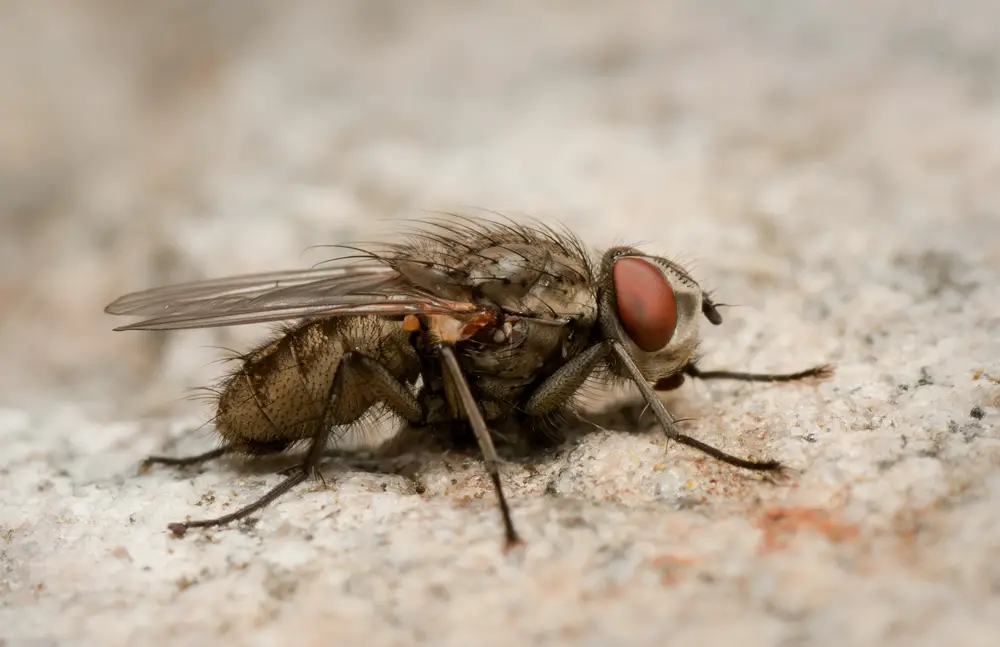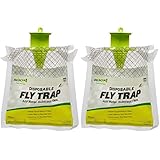Air fresheners are a common household staple, used primarily to eliminate unpleasant odors and create a more pleasant atmosphere indoors.
However, there is a recurring question that tends to arise when it comes to these fragrant products: can air fresheners also serve a dual purpose by killing or deterring flies?
Quick Answer:
Air fresheners are not designed to kill flies. While some may contain chemicals toxic to flies, their main purpose is to mask odors. Air fresheners may temporarily repel flies, but they are not reliable for fly control. Fly swatters, sticky traps, or insecticides are more effective methods to eliminate flies.
Flies are a pesky issue many people face, especially during the warmer months, and finding a solution to this problem is often desired.
Effectiveness of Air Fresheners
Air Fresheners vs. Flies
Air fresheners are primarily designed to mask or eliminate unpleasant odors in indoor spaces. They typically achieve this using fragrances, chemicals, or natural ingredients.
While they may not be specifically designed to kill flies, some air fresheners could have a slight deterrent effect on certain insects due to their strong smell.

However, it is important to note that using an air freshener as a primary method for combatting flies is likely not the most effective approach. Other methods, such as fly traps, insecticides, or natural repellants, will generally yield better results for reducing the presence of flies.
Toxicity of Air Fresheners to Insects
When it comes to the toxicity of air fresheners to insects, it is largely dependent on the specific ingredients found within the product. Some air fresheners may contain chemicals that are toxic to certain insects, including flies.
For instance, pyrethroids are a common synthetic chemical present in some air fresheners and insecticides, which are known for their ability to kill a variety of insects.
On the other hand, many air fresheners are formulated with natural ingredients, such as essential oils, which tend to be less toxic to insects. Although some essential oils, like eucalyptus and peppermint, can have a repellant effect on certain insects, they are generally not potent enough to kill flies.
Natural Fly Repellents
Essential Oils
Essential oils are a natural way to repel flies. Eucalyptus, peppermint, and lemongrass oils are particularly effective in keeping flies away due to their strong scents that flies hate.
To use essential oils as a fly repellent, simply mix a few drops of your chosen oil with water in a spray bottle and spray the solution around your home or outdoor area.
- Eucalyptus: This oil has a refreshing scent that flies find unpleasant, making it an effective repellent.
- Peppermint: Another great option for repelling flies, peppermint oil has a strong scent that flies dislike.
- Lemongrass: With its citrusy smell, lemongrass oil is a popular choice for those looking to naturally repel flies.
Plants and Herbs
Incorporating certain plants and herbs in your garden or around your home can also help repel flies.
Some popular options include:
- Basil: Flies are deterred by the scent of basil, making it a useful plant to have around your home or garden.
- Lemon: Citrus plants, such as lemon, have a strong smell that flies dislike, helping to keep them away.
- Citronella: Well-known for its ability to repel mosquitoes, citronella is also effective against flies.
- Pine: The scent of pine needles is another smell that flies find unappealing, making it a suitable addition to your garden.
- Rosemary: This fragrant herb is not only great for cooking but also works as a natural fly repellent.
Other plants and herbs that can be used to repel flies include lavender, rue, bay leaves, and cloves. These can be planted in pots near doorways or windows to help keep flies at bay.
Additionally, apple cider vinegar can be utilized as a natural fly repellent. Simply mix equal parts water and apple cider vinegar in a spray bottle, and spray the solution around your home or outdoor area.
Fly Infestation Solutions
There are different ways to deal with fly infestations, ranging from natural traps to common pest control methods.
Natural Traps
Natural traps can be an eco-friendly and cost-effective solution for combating fly infestations. These traps typically use food to attract flies and a simple mechanism to trap them.
- Fruit flies: Create a trap using a small container with apple cider vinegar and a drop of dish soap. The flies will be attracted to the vinegar and become trapped in the soap.
- Gnats: Fill a shallow dish with red wine or apple cider vinegar and add a drop of dish soap. The gnats will be drawn to the strong aroma and become trapped in the liquid.
- Houseflies: A DIY trap for houseflies involves using sugar, water, and a plastic bottle. Cut a small hole into the top part of the bottle and place the sugar and water mixture inside to attract the flies.
Common Pest Control Methods
Apart from natural traps, there are also several common pest control methods that can help manage fly infestations.
These methods include various chemical and non-chemical solutions, such as fly swatters, bug zappers, and commercial traps.
- Fly swatters: A classic solution for getting rid of houseflies, fly swatters provide a quick and easy way to eliminate individual flies.
- Bug zappers: These electric devices are designed to attract insects with light and then electrocute them. They can be particularly useful for getting rid of gnats and other small flies.
- Commercial traps: Some manufacturers offer specially designed traps for various flying insects. For instance, ant traps or sticky traps can be useful in capturing and eliminating a variety of small flying pests.
- Pest control services: If the fly infestation is severe or persistent, you might need to call in a professional pest control service for more extensive assistance and solutions.
Types of Flies and Critters
In order to discuss the effectiveness of air fresheners against flies and other insects, it’s essential to understand the various types of flies and critters that might be present in your home.
Common House Flies

House Flies are the most familiar type of fly found indoors, and they’re known for their unhygienic presence around food, garbage, and other rotting substances.
Here are some typical flies and critters:
- Fruit Flies: Tiny flies attracted to fruit, vegetables, and other organic materials.
- Moths: Attracted to fabrics, grains, and pantry items.
- Ants: Industrious bugs that can be found around food sources and nesting in homes.
- Cockroaches: Known for their resilience, these insects prefer dark, damp hiding places.
- Fleas: These small insects feed on the blood of animals and can infest pets and their living spaces.
Less Common Insect Pests
There are many other insects and pests that can infest homes.
Here’s a list of some less common critters:
- Spiders: While often harmless, some spiders can bite and cause unpleasant symptoms.
- Bed Bugs: These tiny insects hide in mattresses and furniture, feeding on human blood.
- Infestation: An infestation refers to the presence of a large number of insects or pests in a home or building.
Preventing Fly Attraction
Maintaining Cleanliness
One of the essential steps in preventing flies from being attracted to your space is maintaining cleanliness. Flies are attracted to organic materials, such as food, decaying matter, and garbage.
Overripe fruits, especially, provide a suitable environment for flies to feed and reproduce. Remove ripe fruits promptly and dispose of the trash regularly.
Moreover, flies are drawn to moist environments, like damp towels, sponges, and even pet water dishes. To prevent attracting flies, ensure that you:
- Keep damp materials dry and clean.
- Dispose of garbage properly in a sealed container.
- Store food in closed containers or refrigerators.
- Regularly clean surfaces where food is prepared and consumed.
Scented Products to Avoid
Several scented products, such as air fresheners, contain volatile organic compounds (VOCs) like ethanol that could be harmful when inhaled continuously. These chemicals might also attract flies due to their strong odors.
Air fresheners with cyclodextrin, like hydroxypropyl beta-cyclodextrin, can help in neutralizing odors without attracting flies.
To minimize the likelihood of attracting flies, opt for fragrance-free cleaning products, or select those with mild, natural scents, such as:
- Essential oils – e.g., lavender, lemongrass, or peppermint
- Unscented detergents, soaps, and cleaning supplies
- Natural air fresheners, like baking soda or activated charcoal
Eco-Friendly and Organic Alternatives
Natural Insecticides
Using natural insecticides is a green and organic way to keep flies at bay. Many of these insecticides have low toxicity levels for humans and pets, reducing the harmful side effects on the environment.
- Pyrethrum: Derived from chrysanthemum flowers, pyrethrum is a popular organic insecticide that is effective in killing flies. It attacks the nervous system of insects, paralyzing and eventually killing them. Pyrethrum can be found in commercial fly sprays or in concentrated form.
- Neem oil: Produced from the seeds of the neem tree, this oil acts as an insect repellent and insecticide. It is known to be safe for humans, animals, and beneficial insects like bees and butterflies. Mix neem oil with water and spray it on your windowsills or other surfaces flies frequent.
- Diatomaceous earth: A naturally occurring, soft, sedimentary rock made from fossilized remains of diatoms, diatomaceous earth is a non-toxic, eco-friendly option to consider for fly control. Sprinkle the powder in areas where you’ve seen flies, and it will dehydrate and kill them as they come in contact with it.
DIY Fly Repellents
There are several easy, environmentally friendly, and cost-effective DIY fly repellents that can be made at home:
- Essential oils: Certain essential oils, such as eucalyptus, lavender, and lemongrass, are known to repel flies effectively. Combine these oils with water in a spray bottle, shake well, and spray on surfaces where flies are commonly found.
- Herbs and plants: Planting fly-repelling herbs and plants like basil, mint, and lavender in your garden or window boxes can help deter flies from entering your home. These plants give off a scent that is pleasant to humans but unappealing to flies.
- Vinegar trap: Fill a small container with apple cider vinegar and a drop of dish soap, then cover it with plastic wrap and poke small holes in the top. Flies are attracted to the scent of vinegar, but the soap breaks the surface tension, causing them to sink and drown.
Products on the Market
Effective Fly-Repelling Scents
- 2 Ounce Organic Cinnamon Cassia Oil Spray – Made from 100% pure & natural usda organic cinnamon cassia essential oil
- 2 Ounce Bottle With Mist Sprayer – Designed aromatherapy spray mister to fill the room full of wonderful scent
- Fresh Scent Of Cinnamon Cassia – Unlike other competitors out there, our essential oils are 100% pure and consistently gc-ms tested to ensure their purity
One popular air freshener brand for repelling flies is Febreze. Its effectiveness in eliminating odors and making the environment smell pleasant can potentially ward off flies.
With a variety of scents available, you have numerous options to choose from. Other popular scents for repelling flies are:
- Cinnamon: A pleasant and effective fly repellent, cinnamon can be found in various air fresheners and essential oils. Using cinnamon-scented air fresheners can not only make your space smell amazing but also help to keep flies at bay.
- Lavender: Known for its relaxing aroma, lavender is also useful in warding off flies. Many air fresheners and essential oil diffusers incorporate this scent to keep both your space smelling fresh and pests away.
- Eucalyptus: Another powerful fly-repelling scent, eucalyptus can be found in various forms, such as air fresheners, candles, and essential oils.
Air Fresheners to Avoid
While some air fresheners can help repel flies, there are certain scents and products one should avoid when trying to ward off these pests.
These may include:
- Any sweet, sugary, or fruity scents as they tend to attract flies instead of repelling them.
- Air fresheners contain harmful chemicals, which may be dangerous for you, your family, and your pets. Look for natural or eco-friendly alternatives when shopping for air fresheners.
By choosing effective fly-repelling scents and avoiding counterproductive products, you can create a more comfortable, fly-free living space.





